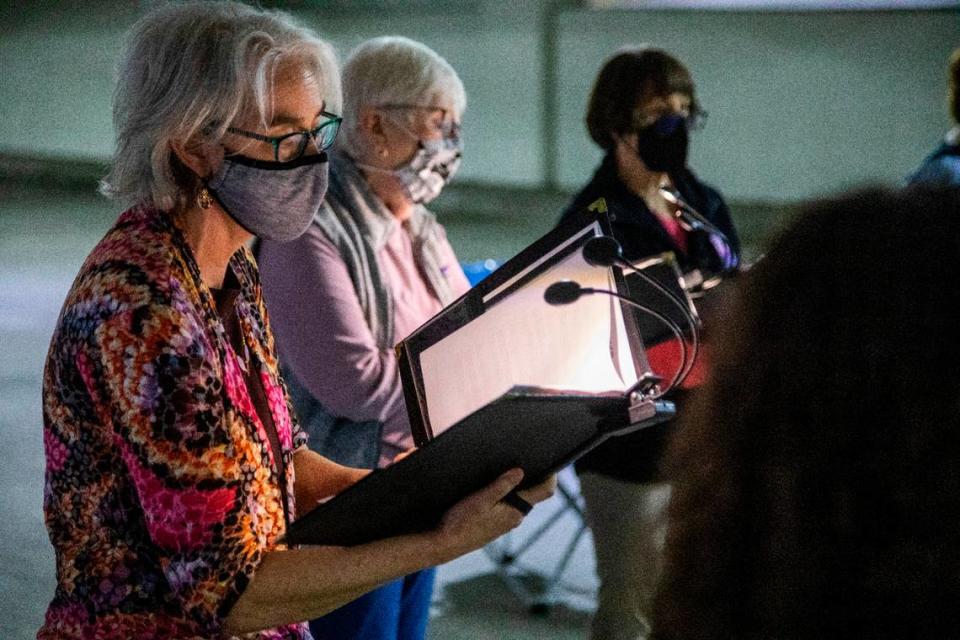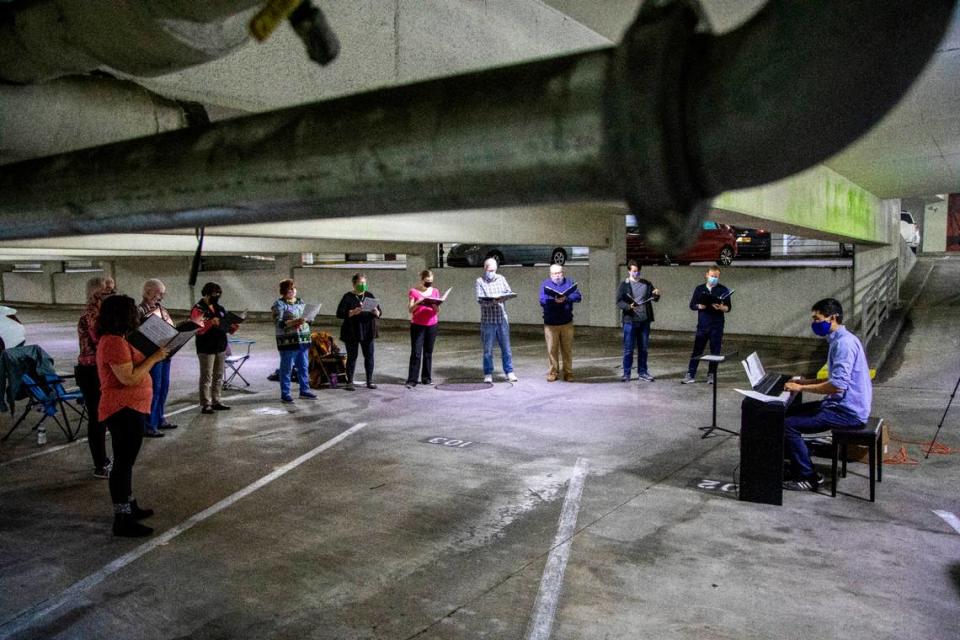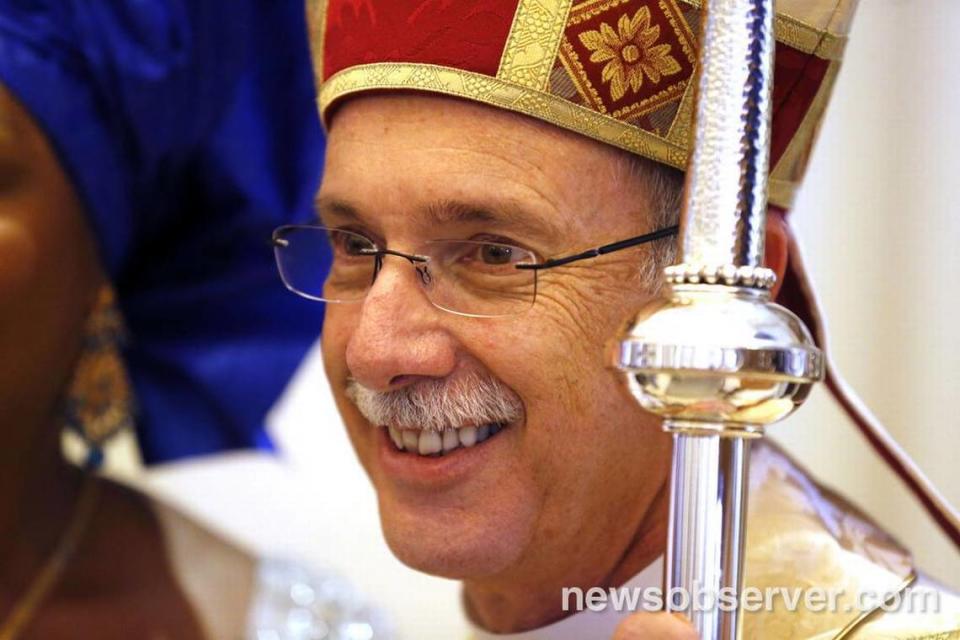After a long year of pandemic darkness, churches welcome Easter’s promise of light
University Presbyterian Church’s music director, Joey Fala, was thinking practically when he asked his choir to rehearse in a parking deck off Rosemary Street in Chapel Hill on the three Wednesday nights before Easter.
It was outdoors, but sheltered in case of bad weather. It had some lights, and an electrical outlet where he could plug in a keyboard. And its concrete surfaces formed a natural amphitheater, making a dozen rusty voices sound like a band of angels.
But it was hard not to draw analogies to the very story of Jesus’ death and resurrection that choir members were preparing to celebrate. Except for a short gathering on Christmas Eve, Easter morning will be the first in-person worship service for University Presbyterian’s congregation since the pandemic forced the closure of the church building more than a year ago.
Rehearsals were held on the lowest level of the deck, a story below ground. It was chill and damp and so dim the singers needed flashlights to read their music. Above them, drivers on Rosemary Street whizzed past unaware.
Performing an arrangement of “Amazing Grace” live in four-part harmony on the front porch of the church for congregants gathered on the lawn in the Easter morning sun will be like coming out of the dark tomb and into the light.
That’s how Easter will feel for many Christians this year.
“A lot of people are starting to feel like there is some light at the end of the tunnel,” said Jarrett McLaughlin, who pastors University Presbyterian with his wife, Meg Peery McLaughlin, “That cannot help but resonate with the Easter proclamation. We’re definitely feeling all of that in this season of Lent. In some ways, it’s been a year of Lent.”

The promise of Easter 2021
The 40 days of Lent leading to Easter are the period of preparation and reflection during which Christians consider the sacrifice of Jesus Christ and his retreat into the wilderness before beginning his public ministry. Believers who observe Lent may deny themselves something during that time as a reminder of Jesus’ fasting in the desert. In recent years, some have decided instead to add something, such as volunteer work or daily meditation.
Typically, the last week before Easter — Holy Week — may include several church services that remind congregants of the final events of Jesus’ life as recounted in the Bible. The week begins with Palm Sunday, marking Jesus’ triumphant entrance into Jerusalem, followed by his last meal with his disciples, his arrest, conviction and crucifixion on the cross.
Easter is the climax of Holy Week, celebrating Jesus’ resurrection from the dead and offering hope to believers for redemption in this life and in an afterlife to come.
In 2020, Easter came just a month after schools, businesses and churches shut down in an effort to reduce the spread of COVID-19. Most traditional church celebrations were canceled, and the message of hope found in the Gospel stories of Jesus’ death and resurrection was a promise that after weeks or months of certain deprivation and isolation caused by the pandemic, life would get better.
Easter 2021 seems to bring some fulfillment of the promise.
COVID-19 still looms, with average cases in North Carolina increasing slightly in late March after making major declines from the peak of the pandemic. Variants of the virus remain an unknown threat.
But the number of residents vaccinated against the virus rises daily too, and research indicates all the vaccines available help prevent infection and slow spread. Many students across the state have returned to school. Families are able to visit elderly relatives, including those who have sheltered in place in nursing homes.
Gov. Roy Cooper has loosened restrictions on social gathering crowd sizes. Businesses have expanded their hours. Concert and festival planners are putting events back on their calendars.
Churches that didn’t already resume in-person worship are considering how they can do so in coming weeks or months.
And it all coincides with the arrival of spring and the blooming of daffodils, camellias and wild violets, visual evidence of rebirth and renewal.
“What Easter means to me is, there is no such thing as anything being beyond repair,” McLaughlin said. “There is always new life on the other side of whatever dead ends we feel like we’re in.”

The power of singing
Katherine Savage, a soprano who has sung in the choir at University Presbyterian for 15 years, continued to worship with her church community online as it and thousands of others migrated to Facebook or YouTube during the pandemic. But it’s not the same, Savage said. She was thrilled to be rehearsing again, even in a parking garage.
“For me, the singing, the music, it’s an important way that I worship,” Savage said.
While University Presbyterian is not yet ready to return to regular in-person worship, Fala said the Easter gathering — masked and socially distanced — will be a great moment for those who have yearned for the fellowship of their church family. Even videos of the choir performing woven into recorded weekly services have been a tonic for the congregation, Fala said.
Fala joined the church as its music minister last June, three months into the pandemic.
“It meant so much to congregation members to see us together singing,” he said. “Just because it’s something we haven’t seen in so long. Just the visuals of people being together and making music together again has given people this real feeling of hope, that things are changing. That we’re on the recovery side of this.”
The Passage Church in Knightdale began holding in-person services with limited seating last summer, in addition to its online offerings. For Easter this year, founding Pastor Matt Walton said, the congregation created some 800 Easter Egg Hunt Kits, paper bags filled with a dozen candy eggs, and delivered them last weekend to homes around town.
Every Sunday, Walton said, is a celebration of the resurrected, living Christ, but Easter brings it into the sharpest focus and generates excitement.
One of the things Walton is most excited about, he said, is the possibility of returning eventually to “normal” worship, with two Sunday services drawing 375 people who can worship together with no masks.
“We desire to be in community, in relationship with one another,” Walton said. “There is only so much that you can do through Zoom that people really connect with.”
For all the hardship of the past year, Bishop Luis Zarama of the Catholic Diocese of Raleigh says, there is much for which to be grateful.
“Yes, it has been a very tough time,” Zarama said. “We lost some people because of the COVID-19. People are suffering, some of them because they lost their jobs. There is distance between families because they cannot see each other.
“But Easter teaches us that a rough time is not the end. A rough time is a purification to celebrate Easter.
“We need to see everything with the eyes of God, with the love of God. We have had this time of purification to help us celebrate the mystery of faith.”

‘If we don’t have hope, we don’t have faith’
Within the church, pastors say, it’s important to tell the whole story of Jesus’ life and death for the Biblical miracle of his resurrection to resonate in believers’ lives today. Without darkness, there is no emergence into light.
The pandemic year has been a great darkness for many, and whatever light Easter can bring or hint at is welcome.
“If we don’t have hope, we don’t have faith,” Zarama said. Throughout the pandemic, it was hard not to feel bombarded with so much bad news that many people experienced what he called “spiritual indigestion.”
But if they look at the situation another way, he said, they might see the blessings of being able to spend more time with their children because schools were closed, or the opportunity to slow down because businesses weren’t operating as usual.
“So in the middle of everything, many blessings were there,” he said. “That is why it’s important to have Holy Week: to understand that the cross was not the end for Jesus. It looked like it was the end, but it was not. So we are always hoping for something much, much better.”
With each Easter comes a challenge, Zarama said, another opportunity.
“The thing is, when we lose hope, we are unable to see the blessings the Lord is bestowing on us every day. We have been able to see another spirit of life. I hope we see these gifts. It will be up to each one of us to apply the lessons and make a difference in life.”

